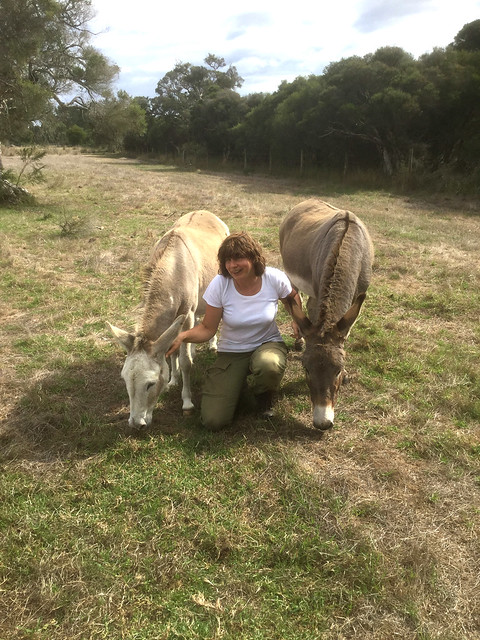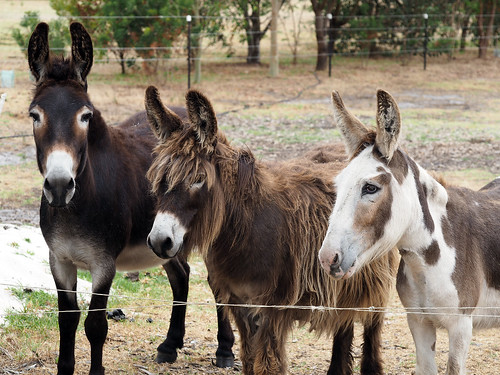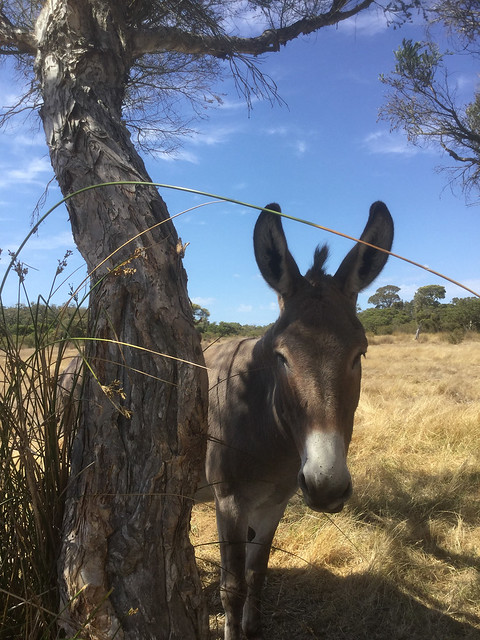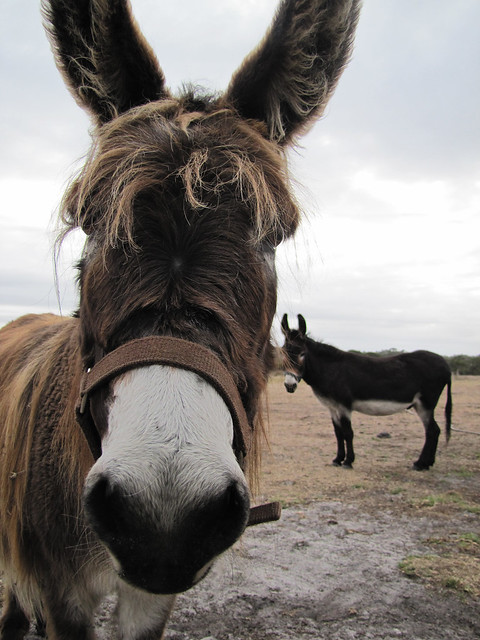A version of this article was published in Grass Roots 256 in Dec 2019/Jan 2020.
In late 2018, I had an unexpected telephone call. The man on the line said he knew from a friend that we had a group of three donkeys courtesy of the Donkey Society – and would we like two more? He was selling his farm and needed a good long-term home for his mother-son donkey pair.
We have a limit on recreational herbivores at our place, because you need to look after them properly and because we are also serious about producing food on our farm. Our 12.5 hectares of pasture is therefore mainly intended for our small herd of beef cattle. We already had Don Quixote, Mary Lou and Sparkle. Also, we had four horses – two retirees, Sunsmart the riding horse, and one recent off-racetrack adoption we offered the spot that became vacant when our old chestnut mare developed a terminal brain tumour and had to be put down.
Landcare Considerations
Horses are especially tough on Australian country, because of their large size, hard hooves, and propensity for hooning around the place. Ours regularly race each other for fun in the paddock, which is normal for ex-racehorses in good shape – all our horses are recycled harness racing horses. We have managed to divert some of their flat-out sprinting to sandy firebreak tracks they gladly adopted for this purpose, which means less holes in the turf. We also keep a good buffer of vegetation cover over the soil for protection by not overstocking. Additionally, we made the decision last year that we would reduce our horse group to three by not replacing our next loss – for the sake of the land, as well as my back. I trim all the hooves around here, and am not getting any younger.
Romeo’s Golden Age
We could see that the next loss was just around the corner. Our anicent horse Romeo had for years been on a special diet that was keeping him in good condition despite significant tooth loss and advanced old age. Last October, he turned 34, had lost all the molars in his bottom jaw, and was spending the majority of his days either trying to process food, or resting quietly. He was living in our garden full-time by then, but struggling more and more to eat even the tender green grass it provided for him year-round – a serious problem, as horses normally graze around 16 hours a day and are prone to stomach ulcers on bucket feeds alone. He was spitting out more grass than he was able to get down, and since his concentrate feeds were at a maximum and there are no dentures for horses, the writing was on the wall.
We didn’t want him to get hungry and miserable, so we spoilt him rotten for one last, long, lovely summer – soft juicy plums and peaches off our trees which he chewed slowly and with great delight, lots of brushing itchy spots, lots of cuddles and sitting in the shade chatting with him – and then our equine Methuselah was put down in late March, before his quality of life and body condition would have deteriorated unacceptably. I knew the horse for 31 years since he had come off a dog auction truck as a 3-year-old, had snuck many rides on him when both of us were young, and jumped at the chance to retire him on our farm when we tree-changed back in 2010. It was great to have this old friend with us for his very, very golden years, happy to the last.
More Donkeys?
So, said the man on the phone, did we want more donkeys? I arranged a time to go have a look, and rang my husband at work to say, “Guess what?” Brett is crazy about our donkeys. He laughed and laughed, and I could hardly get a sensible word out of him. When he came home, he laughed some more, and hugged me. “It’s up to you,” he said. “You’re the one who trims hooves around here!”
We both knew the situation with Romeo, and sometimes it seems as if the universe just sprinkles a little glitter dust your way at the right time. A similar thing had happened when we adopted our kelpie Jess from the farm dog rescue just before my old Arabian mare got cancer in 2013 and needed to be put down a few months later. I lost my longest-standing animal friend ever back then, but this gorgeous, energetic dog was determined to fill up any available space in my heart.
We went and looked. They were comparatively big donkeys, like our Don Quixote. The mother was a skewbald called Nelly, the son a dun by the name of Ben. They were very placid donkeys compared to the ones we already had at home. I could pick up their feet in the paddock, just like that, no halter required. This was even better than I expected – I didn’t want a rodeo at hoof-trimming time, and this level of instant cooperation was sheer luxury.
Also, neither of them were overweight – that had been our other main concern, because excess weight in donkeys makes them prone to serious illness and takes a lot of time and care to manage. We already had two like that back at home, who had arrived obese and need grazing muzzles whenever there is lush pasture around. Ideally, Don Quixote and Mary Lou would be working a large stone-grinding flour mill for several hours each day, but we don’t have one!
Those Itchy Spots
We stood there chatting to the owner, with Ben and Nelly sidling up to us. They were friendly and curious, but a little shy, until I started gently scratching them, carefully figuring out where their preferred areas were. (All animals have itchy spots. This was even true for a camel I encountered in an animal park a while back. After a little camel whispering, I learnt that it had a really itchy spot in the bend of its neck, and it was delighted when I applied myself to it, craning its neck and wiggling its lips in the air. The keeper told me later that the camel wasn’t normally sociable around visitors. That’s probably down to lack of animal etiquette and itchy-spot detection skills.)
Ben and Nelly told me that while their backs and shoulders and tails were nice places to have rubbed, their favourite scratchy place was inside their large bunny ears. This is unsurprising for donkeys, and results in generous coatings of donkey earwax all over your fingers, if you are prepared to really go to town – which is what they will beg you to do. If you’re squeamish, or well manicured, you can use thin cotton gloves for this task, then throw them in the wash. I am neither, so I just use soap and scrub my fingernails. Occasionally I look longingly at the pearl nail varnish I used to wear before tree-changing, but it just never seems to be practical these days.
New Adventures
By this time, the process of getting besotted was starting on both sides – human and asinine alike. Take care with that, because donkeys commonly live into their 40s! Brett and I looked at each other and nodded. These guys could come home with us, and I would trim eight more hooves every 5-6 weeks. We shook hands with their owner and sealed the deal.
On the weekend, we borrowed our neighbour’s ute and a trailer and collected the donkeys. It took us an hour to get them to load, while they mostly stood there considering whether what we were asking was something they really wanted to do. Donkeys are thinkers and won’t be rushed into anything they find suspicious. You have to explain everything to them in detail and ask nicely. Personal demonstrations of something being a safe task and a bucket of treats are both very helpful when asking a donkey to do something it considers to be unusual or unpleasant.
Nelly and Ben were more interested in reassurance than food – which is where they differ drastically from our bunch of hooved hyenas at home. With gentle coaxing, they gradually loaded, we secured the back door, and slowly drove them to their new home.
Nelly and Ben are adventurous beasts, and have made us laugh many times already with their antics, which I will write about next time. Also, I will tell you how I fixed Nelly’s collapsed heels and Ben’s eroding hoof walls, and how they were mad keen to tag along whenever they saw us going anywhere on foot or horseback.
More donkey photos here: https://www.flickr.com/photos/redmoonsanctuary/albums/72157689060389665












Hi Sue
Read your stories in Grass Roots, just adore all of your pictures. I have a soft spot for donkey’s, they are so intelligent and of course I love horses. You do a great job and your stories are quite amusing. Keep up the good work.
Dear Sally, I only just saw this because I’ve not looked at this in a while! Donkeys are very Zen! And amusement is part of the aim – we all need to see the absurd side of things and have a good laugh…